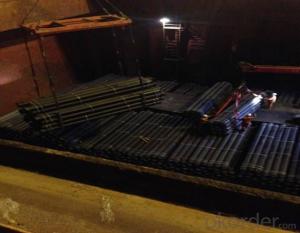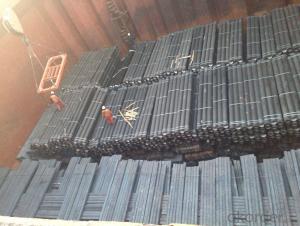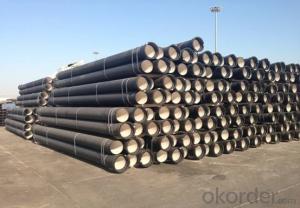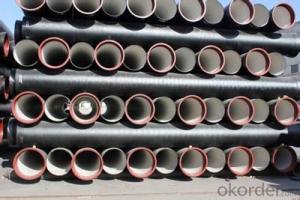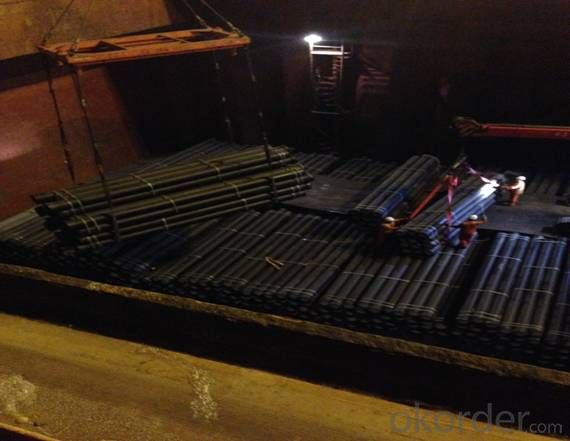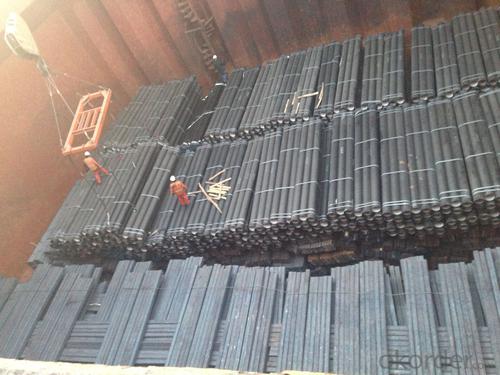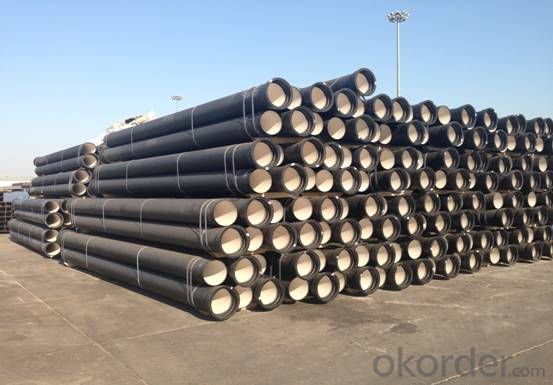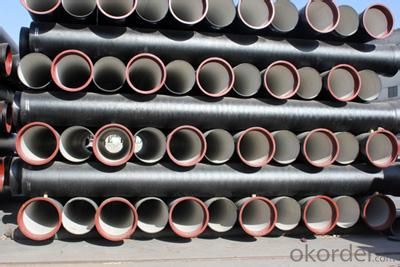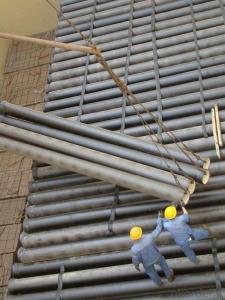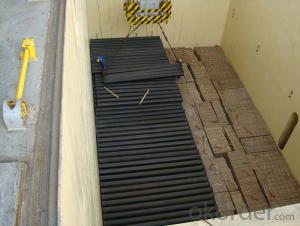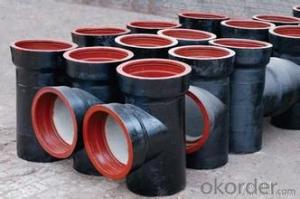DUCTILE IRON PIPE K9 DN500
- Loading Port:
- China Main Port
- Payment Terms:
- TT OR LC
- Min Order Qty:
- -
- Supply Capability:
- -
OKorder Service Pledge
OKorder Financial Service
You Might Also Like
Ductile Iron Cast Pipe is without any defects compare with tradition casting tech, which has many advantages particularly as follow:
(1) High density. In the "vertical upward casting" process, the melt iron of centre liquid column in center crystallizer is continuously feeding for volume shrinkage caused by condensation tube at outer circumference , which lead to be free of shrinkage porosity.
(2) High purity. When melt iron pouring, the mixed impurities such as gas, dross, sand grain which are lighter than melt iron could be eliminated at furnace mouth, its impossible to enter into the crystallizer through the channel, so the melt iron into the crystallizer is very pure.
(3) Strength with toughness. The cooling speed provided by continuous crystallizer is 30 times than sand casting and 5 times than centrifugal casting, and doesn't produce white iron, the eutectic cell volume of continuous cast iron is one eighth to one tenth compare with traditional cast iron. The density of graphite nodule in ductile iron can reach 300-700 pcs/mm2. Therefore, all reason above improve the strength and toughness of continuous cast iron.
(4) Free machining. The high speed cooling make the hardening phase (such as boride, steadite) not appear like reticular, massive or thick, but diffuse like fish bone and pane in shape, moreover, there are tiny graphite flakes inlaid hardening phase. It's free machining in BrinellHardness the range of 250-300HB. However, the Brinell Hardness of 250 is top limit to common metal materials.
(5) Uniform composition of tube wall. The convection mixing of liquid column caused by marching type drawing in crystallizer make the composition of tube wall well-distributed, and concentration gradient very little.
(6) High productivity. To the wall thickness of tube under 10mm, the speed of continuous casting is 1 meter/min, to the wall thickness of tube under 20mm, the speed of continuous casting is 0.5 meter/min, which is high efficiency that centrifugal or other casting tech couldn't reach.
- Q: How do ductile iron pipes perform in sandy soil conditions?
- Ductile iron pipes perform well in sandy soil conditions due to their inherent strength and durability. The material's high tensile strength allows it to withstand the pressure exerted by the surrounding soil, preventing pipe deformation and breakage. Additionally, the corrosion resistance of ductile iron ensures a longer lifespan, even in corrosive sandy soil environments.
- Q: How are ductile iron pipes protected against external soil loads?
- Ductile iron pipes are protected against external soil loads through a combination of proper installation techniques and the use of protective coatings. The pipes are installed in a manner that allows for adequate support and backfilling, which helps distribute the external soil loads evenly. Additionally, these pipes are often coated with materials such as epoxy or polyethylene to provide a barrier between the pipe and the surrounding soil, preventing corrosion and damage from external forces. This protective coating ensures the longevity and durability of ductile iron pipes in underground applications.
- Q: Are ductile iron pipes suitable for road crossings?
- Yes, ductile iron pipes are suitable for road crossings. Ductile iron is a strong and durable material, making it well-suited for underground installations such as road crossings. The pipes have high tensile strength, which allows them to withstand heavy loads and traffic pressures without cracking or breaking. Ductile iron pipes also have excellent corrosion resistance properties, ensuring their longevity even in harsh environments. Additionally, these pipes are easy to install and maintain, making them a reliable choice for road crossings.
- Q: Can ductile iron pipe be used for potable water systems?
- Yes, ductile iron pipe can be used for potable water systems. Ductile iron is a strong and durable material that is resistant to corrosion and can withstand high pressure and flow rates. It has been widely used in potable water systems for many years due to its reliability and longevity. However, it is important to ensure that the pipe is properly coated or lined to prevent any leaching of iron into the water.
- Q: How does ductile iron pipe perform in areas with high soil movement?
- Ductile iron pipe possesses notable attributes of strength, durability, and flexibility, rendering it an optimal selection for locales with substantial soil movement. Differing from alternative piping materials, like PVC or concrete, ductile iron pipe demonstrates the capability to endure significant ground shifts without undergoing catastrophic failure. The inherent robustness of ductile iron pipe empowers it to withstand the external forces imposed by soil movement, encompassing settlement, lateral displacement, and ground heave. Its elevated tensile strength and capacity to endure bending stresses render it less prone to developing cracks, fractures, or leaks, thereby ensuring the pipeline system's integrity. Moreover, ductile iron pipe exhibits remarkable deflection capabilities, imparting the capacity to flex and accommodate ground movement without succumbing to breakage. This flexural aptitude enables the pipe to disseminate the stress engendered by soil movement along its length, thereby diminishing the concentration of forces at any specific juncture. In regions characterized by pronounced soil movement, ductile iron pipe also reaps the advantages of its corrosion resistance properties. Typically coated with a protective layer, such as cement-mortar lining or polyethylene encasement, the pipe serves as a barrier against corrosive elements found in the soil. This protective coating effectively mitigates damage and deterioration, ensuring the pipe's endurance and performance, even in demanding soil conditions. All in all, ductile iron pipe is highly recommended for locales with substantial soil movement due to its exceptional strength, flexibility, and corrosion resistance. Its ability to withstand ground shifts and distribute stress establishes it as a dependable choice for long-term performance, necessitating minimal maintenance.
- Q: Why does the construction wastewater system use ductile iron pipes instead of galvanized steel tubes?
- Then answer your question: first, the strength of ductile iron is much higher than that of ordinary low carbon steel, such as Q235. Corrosion resistance is much higher than that of ordinary steel pipe and the cost is lower than that of ordinary steel pipe. Second, large diameter steel pipe can only be made of spiral welded pipe, seamless steel pipe is particularly expensive, will not be used. The welded pipe is welded, easy to corrosion water leakage. Third, galvanizing is also a life and very expensive, the pipe has a fluid will wear on the inner wall, zinc plating is meaningless. Galvanized pipe is generally used as a water supply pipe, large caliber water pipes, such as more than 250, and now do not use steel pipes, mostly plastic pipes
- Q: Are ductile iron pipes suitable for use in sewage pumping stations?
- Yes, ductile iron pipes are suitable for use in sewage pumping stations. Ductile iron is known for its high strength, durability, and corrosion resistance, making it an ideal material for handling the challenging and corrosive conditions found in sewage systems. Additionally, ductile iron pipes have excellent hydraulic performance and can withstand the high pressures and flow rates typically encountered in sewage pumping stations.
- Q: How does ductile iron pipe compare to PVC pipe in terms of strength?
- Ductile iron pipe is generally considered to be stronger than PVC pipe. Ductile iron pipe is made of iron and carbon, which gives it a high tensile strength and resistance to breakage. It can withstand high pressures and is commonly used in heavy-duty applications such as water mains, sewer lines, and industrial piping. On the other hand, PVC pipe is made of a plastic material called polyvinyl chloride. While PVC pipe is lightweight and easy to handle, it is not as strong as ductile iron pipe. PVC pipe is typically used in low-pressure applications such as household plumbing, irrigation systems, and drainage pipes. When comparing the strength of ductile iron pipe to PVC pipe, the former has a higher capacity to handle heavy loads, withstand ground movement, and resist damage from external factors like rocks or tree roots. Ductile iron pipe is also more durable and has a longer lifespan compared to PVC pipe. However, it is important to note that the choice between ductile iron pipe and PVC pipe ultimately depends on the specific requirements of the project. Factors such as cost, environmental conditions, installation ease, and required longevity should all be taken into consideration when deciding which type of pipe to use.
- Q: Can ductile iron pipes be used for wastewater treatment plants?
- Yes, ductile iron pipes can be used for wastewater treatment plants. Ductile iron pipes are known for their strength and durability, making them suitable for handling the harsh and corrosive environment of wastewater treatment plants. These pipes can withstand high pressures and are resistant to corrosion, which is essential in handling wastewater and various chemicals involved in the treatment process. Ductile iron pipes also have the advantage of being easy to install and maintain, with a long service life. Therefore, they are commonly used in wastewater treatment plants for transporting and distributing wastewater throughout the facility.
- Q: What is the typical lifespan of ductile iron pipes?
- The lifespan of ductile iron pipes can differ based on multiple factors, including pipe quality, environmental conditions, and maintenance practices. On average, these pipes typically last approximately 75 to 100 years. This longevity establishes them as a sturdy and enduring choice for water and sewage transport systems. Through correct installation and consistent upkeep, these pipes can endure corrosion, pressure, and other external elements, guaranteeing their durability and dependability. Furthermore, advancements in coatings and linings have extended the lifespan of ductile iron pipes, making them an exceptional option for infrastructure projects.
Send your message to us
DUCTILE IRON PIPE K9 DN500
- Loading Port:
- China Main Port
- Payment Terms:
- TT OR LC
- Min Order Qty:
- -
- Supply Capability:
- -
OKorder Service Pledge
OKorder Financial Service
Similar products
Hot products
Hot Searches
Related keywords
